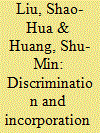| Srl | Item |
| 1 |
ID:
147872


|
|
|
|
|
| Summary/Abstract |
This paper examines contemporary developments among Taiwan’s indigenous Austronesian peoples. We have reviewed major policy changes mainly since the 1980s and their impacts on later developments – both the positive improvements in general well-being and the persistence of ingrained problems among them. Major findings indicate two growing trends among Taiwanese Austronesians. One is the rise of interest in their cultures and efforts to preserve and restore selected indigenous customs and practices. The other trend is a continuous outflow of the indigenes from traditional tribal communities to urban centers for better employment, education, or health care. Their increasing urbanization also contributes to more inter-ethnic marriages and the loss of indigenous languages and practices. The case of Taiwanese Austronesians illustrates the impacts historical and politico-economic processes are having on indigenous peoples.
|
|
|
|
|
|
|
|
|
|
|
|
|
|
|
|
| 2 |
ID:
089380


|
|
|
|
|
| Publication |
2009.
|
| Summary/Abstract |
This article discusses how popular rituals are used to achieve cultural reproduction in Banmai, a Yunnan Chinese village in northern Thailand where I conducted empirical fieldwork between 2002 and 2007. Most Banmai villagers were local militias originally associated with the Chinese Nationalist Party in western Yunnan Province. They went into exile on the Burmese side of the Golden Triangle in or shortly after 1949 when the People's Liberation Army swept through this region, and they ultimately settled in northern Thailand's hill regions in early 1960s. As the self-proclaimed preservers of authentic Chinese culture, Banmai villagers vigorously instituted many traditional practices, following the imagined Confucian orthodoxy, to build a reified community that represents an idealized Chinese spiritual world. Through their participation in popular rituals, we see clearly how villagers have been able to attain the cultural unification that has played a crucial role in meeting their spiritual needs at various levels: the individual, the family, the kin group, and the community.
|
|
|
|
|
|
|
|
|
|
|
|
|
|
|
|